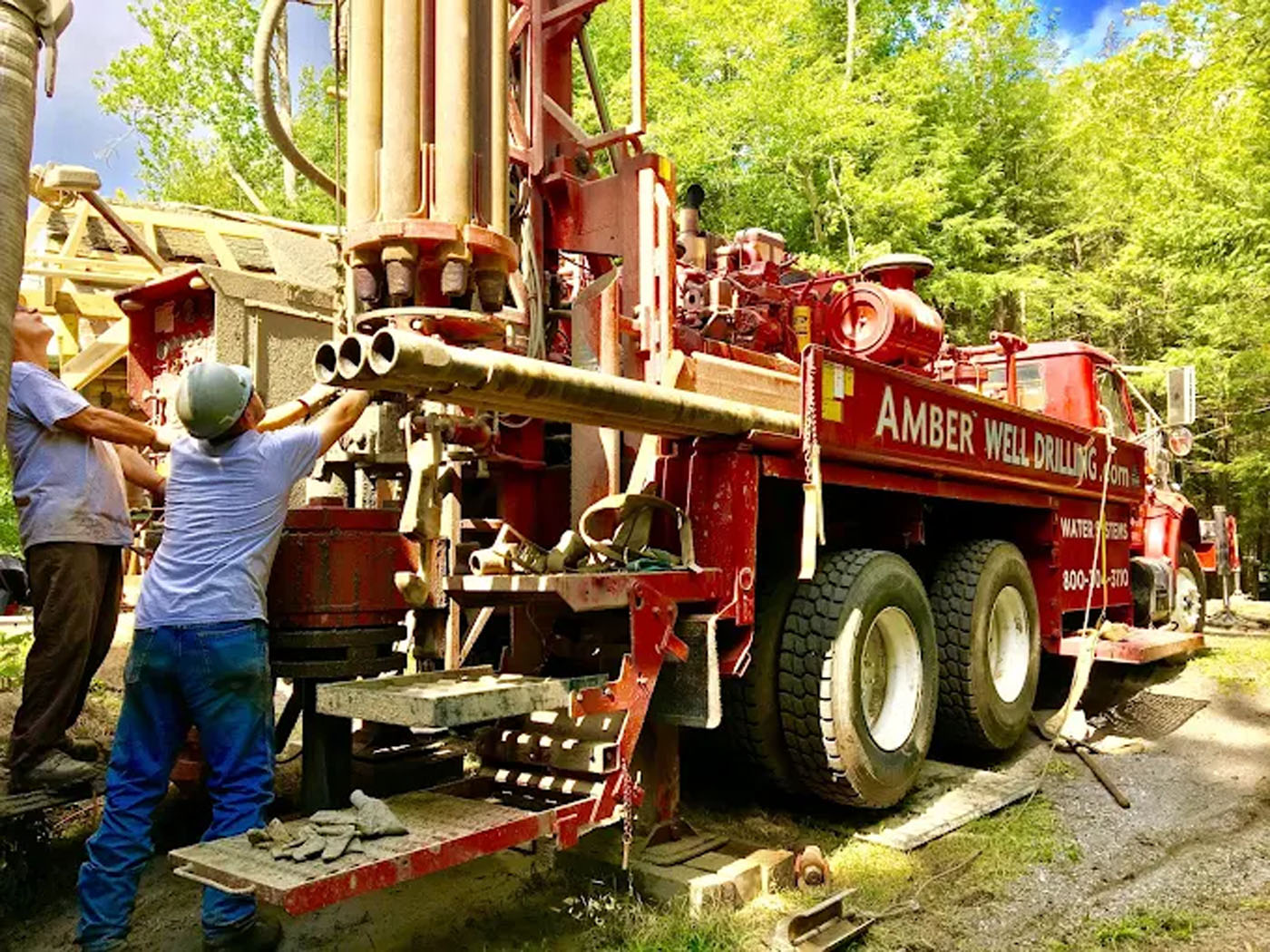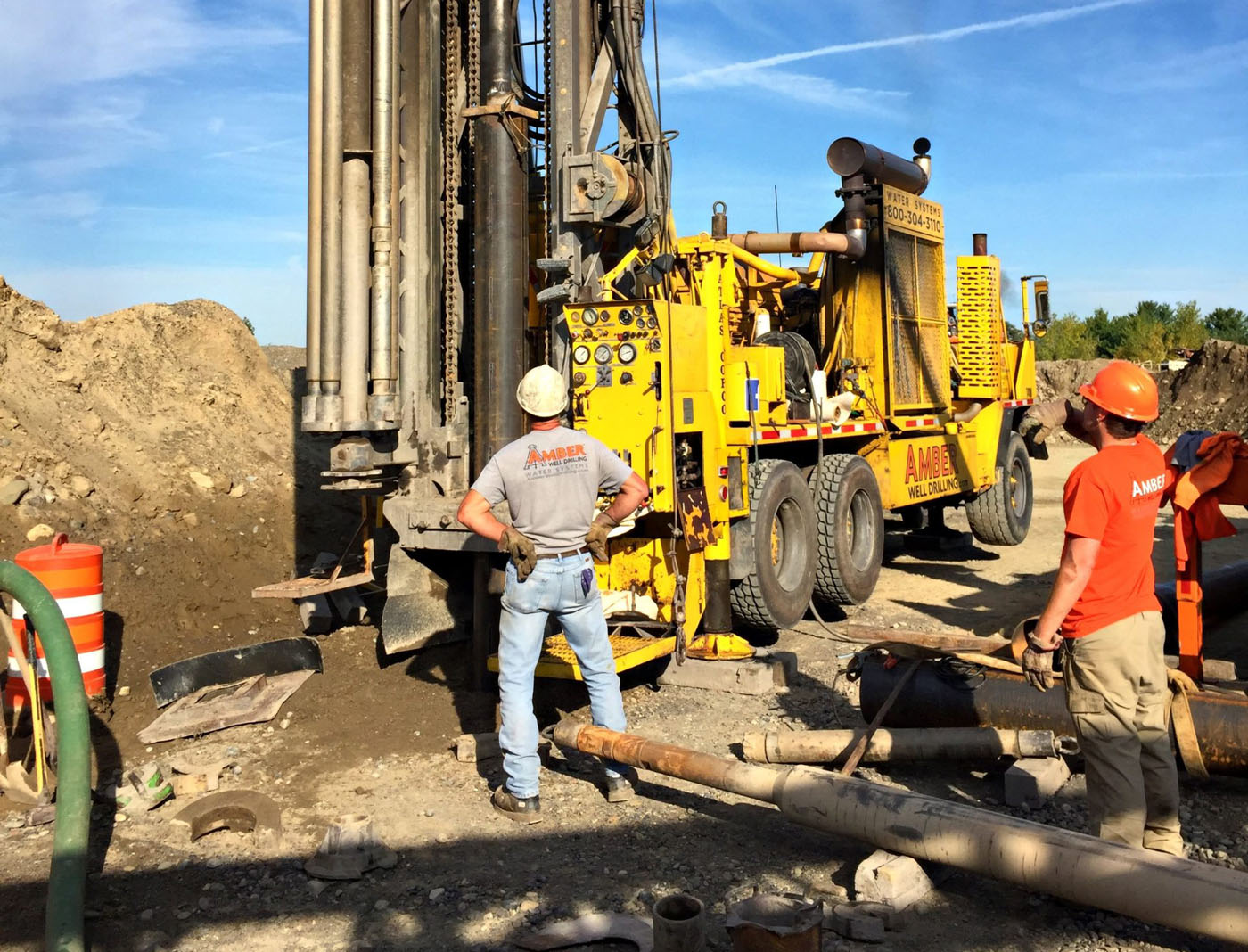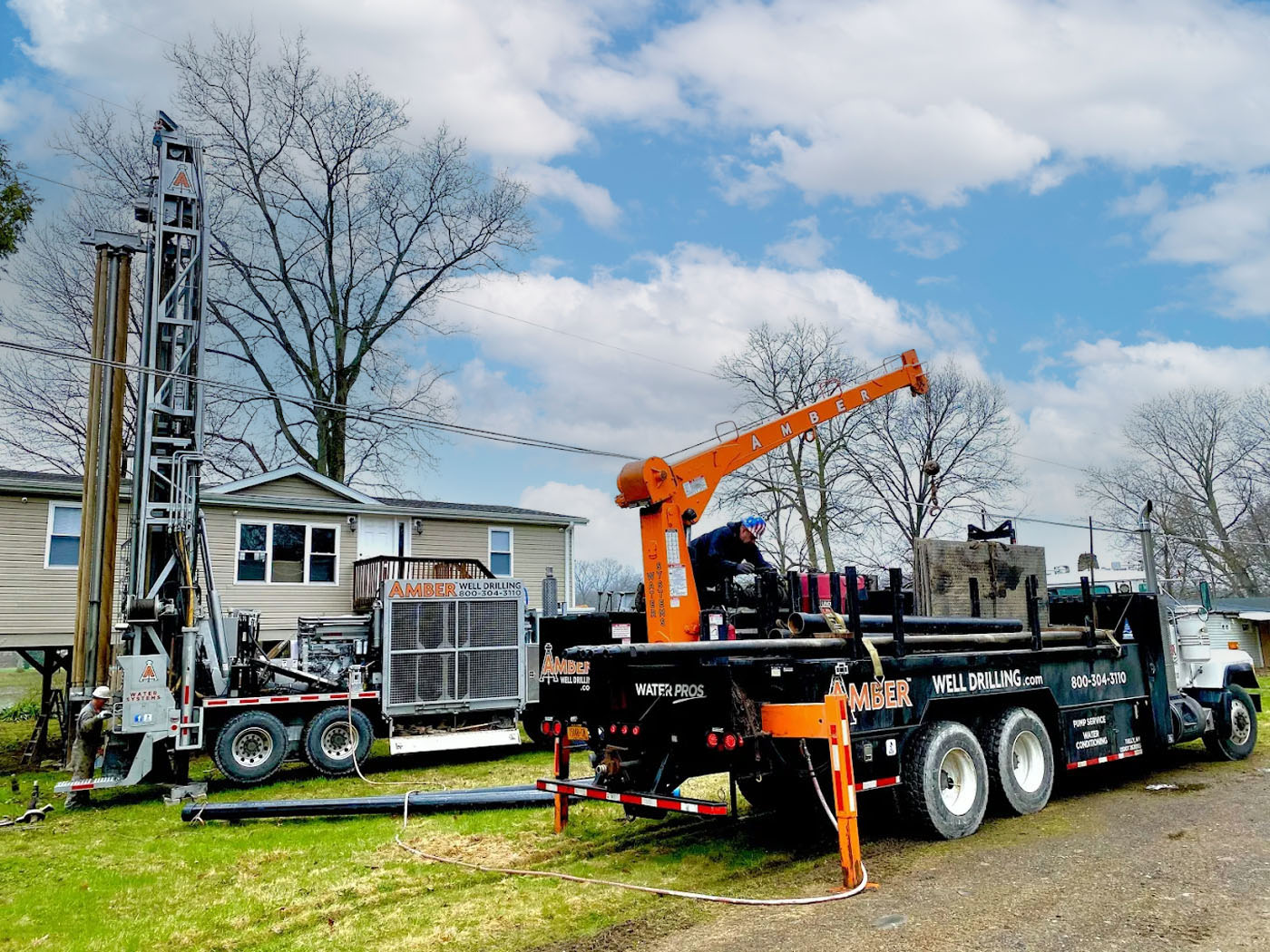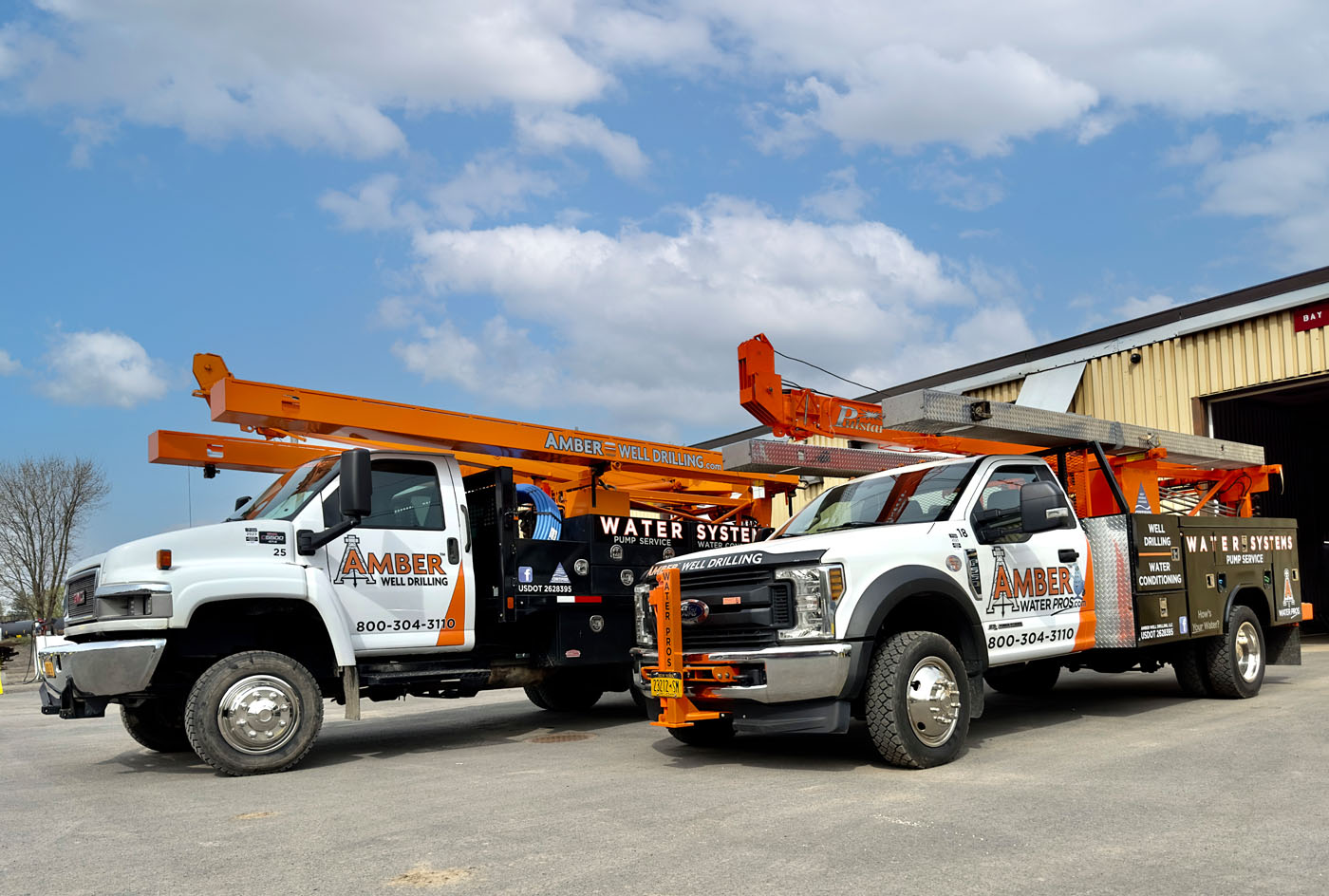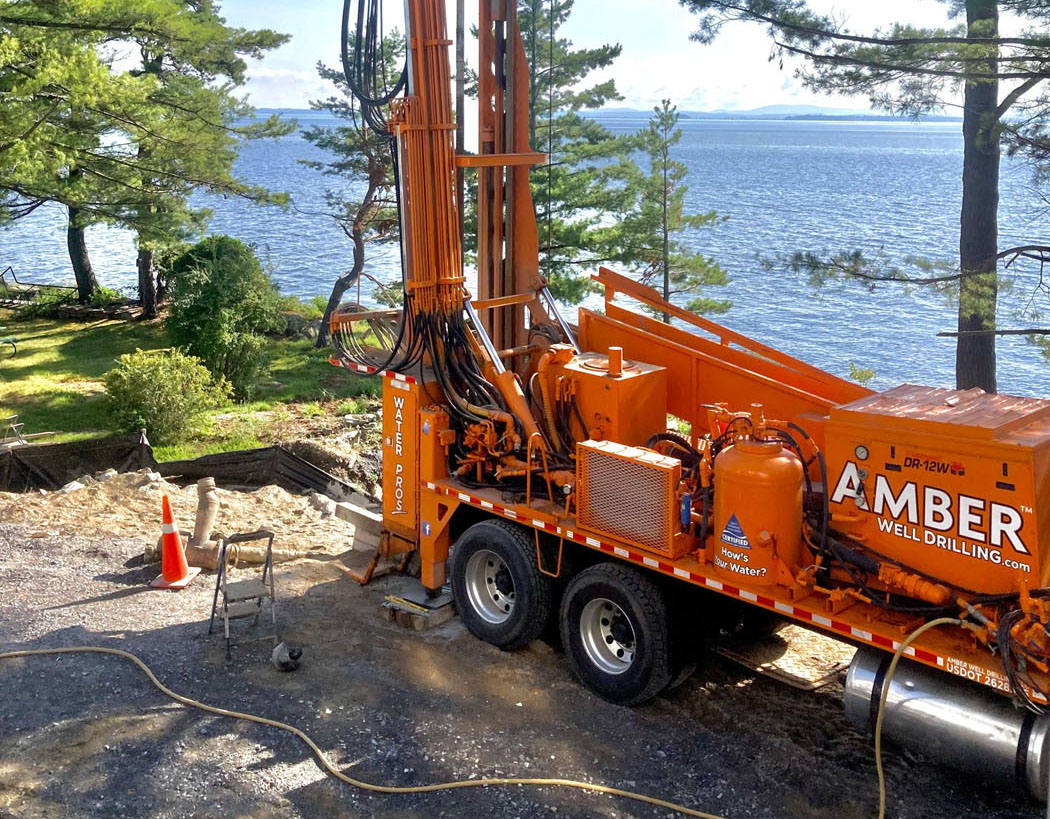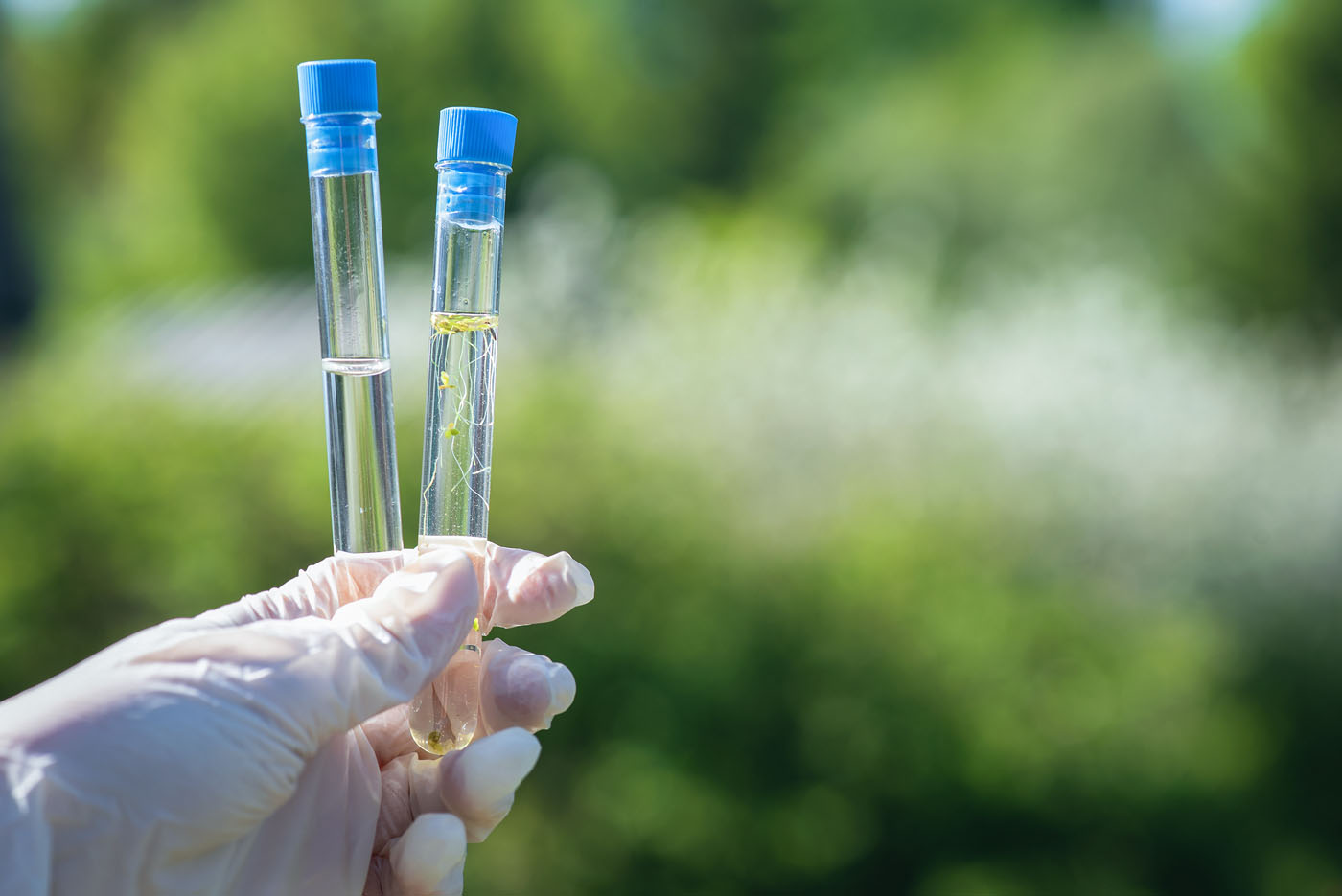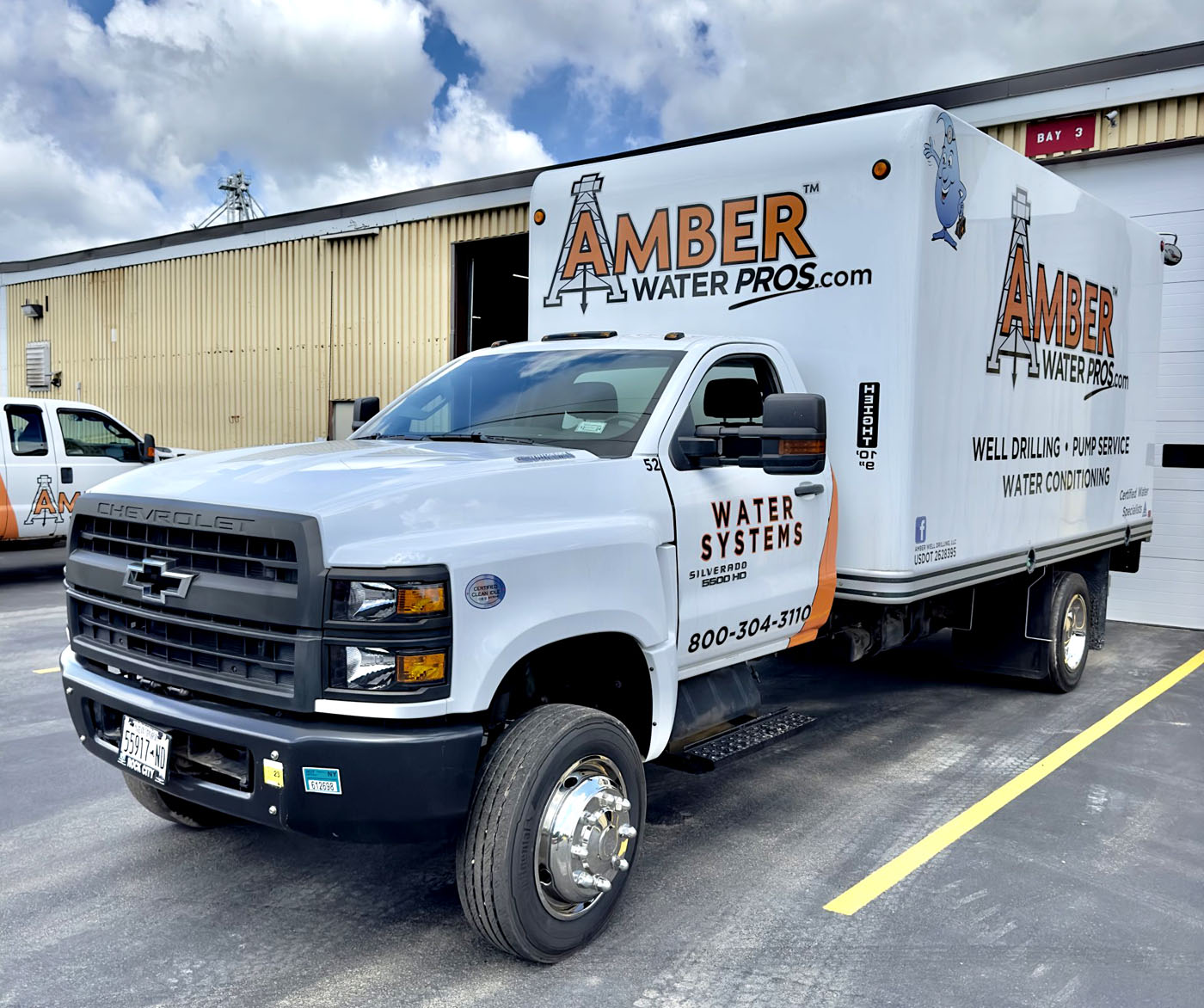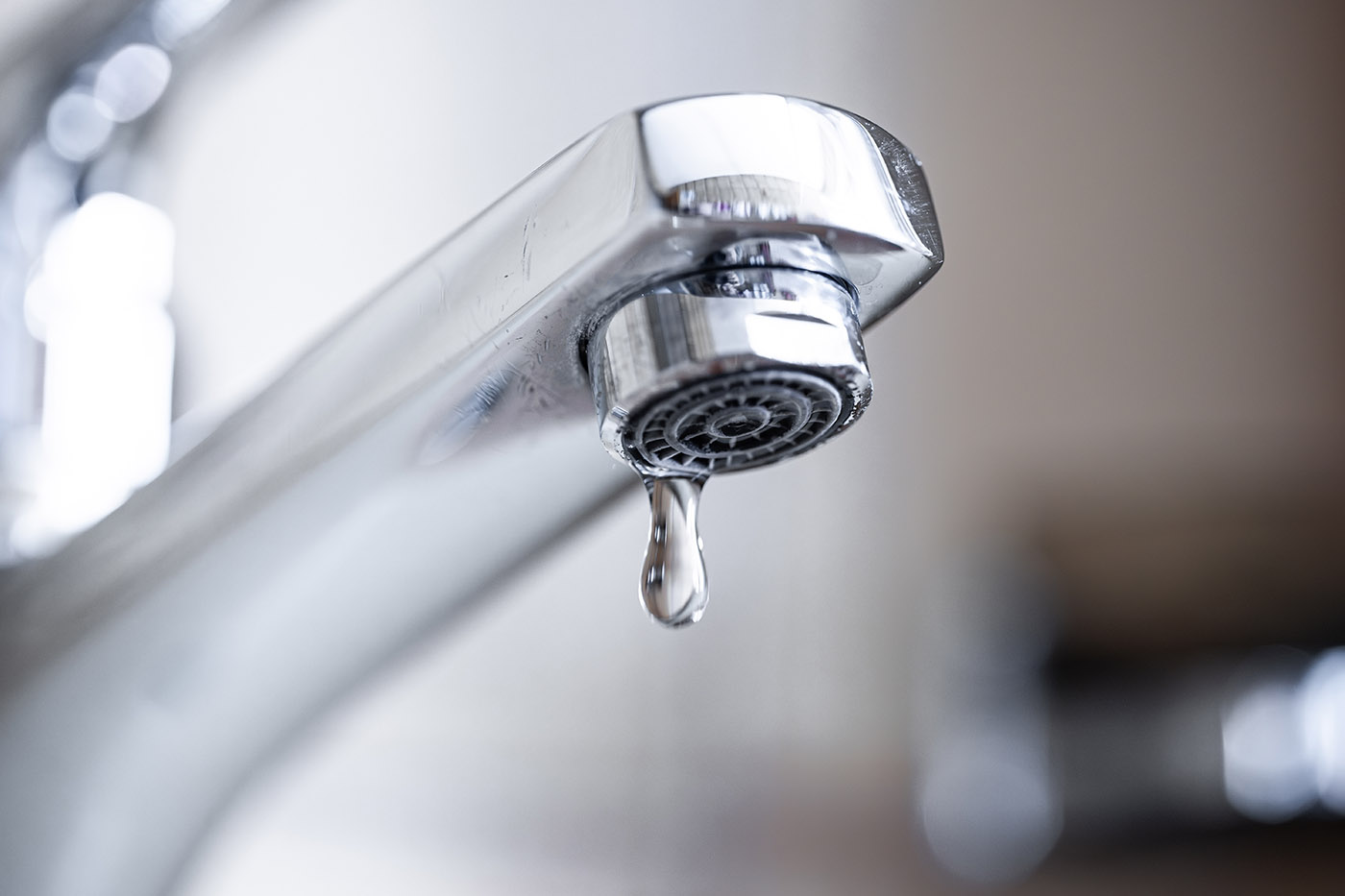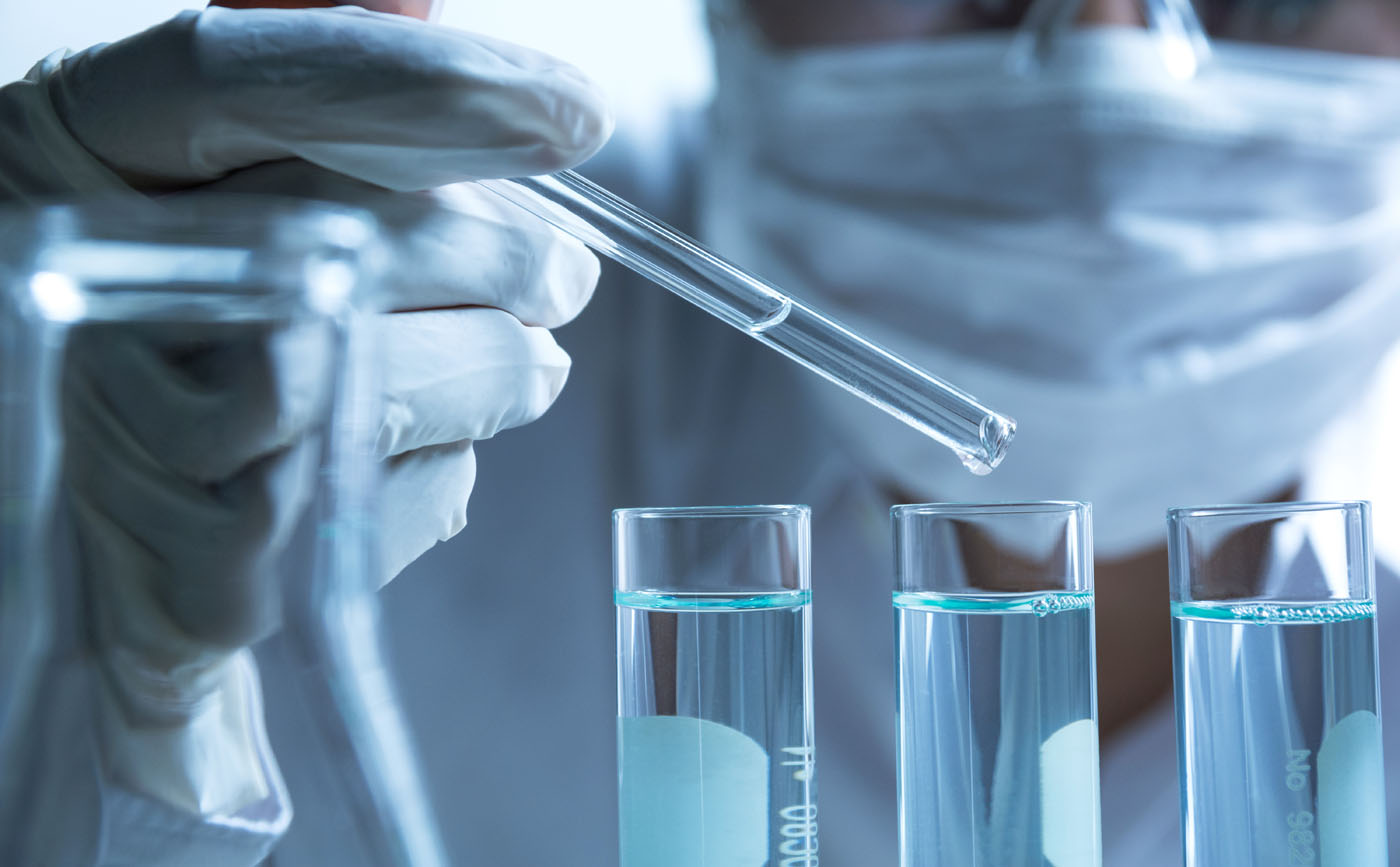
Wells & Well Drilling FAQs
A properly constructed and maintained water system should last up to 20-50 years or more. Initial construction, regular inspections and maintenance, water quality, and environmental conditions all can play a role in the lifespan of your well.
Costs vary based on factors like well depth, geology, and location. It’s best to get a detailed estimate from a licensed well driller for your specific needs. Call us today for a free on-site consultation and estimate for your well drilling project.
It is not recommended to attempt well drilling as a DIY home project. Water well drilling requires specialized equipment, permits, and expertise. Hiring a licensed professional ensures your safety and compliance with regulations.
Most residential wells are between 100 and 500 feet deep, depending on local geology and water levels. A safe depth is determined after a professional assessment of your property.
Choose a licensed, experienced contractor with good local references. Look for companies that use modern equipment, follow regulations, and offer clear communication and warranties.
Water Systems & Pumps FAQs
A well pump should be professionally serviced annually to maintain optimal performance and prevent costly breakdowns. This maintenance typically includes inspecting electrical components, checking the pressure tank, cleaning mechanical parts, and testing water quality.
The installation cost of a well pump varies based on factors such as the type of pump, well depth, and complexity of the installation. Because every situation is unique, it’s best to get a personalized estimate from a trusted well and pump service provider like Amber Water Pros.
Replacing a well pump depends on the pump size, type, and labor involved. Additional factors such as well depth and accessibility can affect the final price. It’s important to work with a licensed professional who can recommend the right pump and handle the replacement safely.
Contact a licensed well and pump service professional when you need your well pump checked. Experts have the tools and experience to diagnose problems accurately and perform necessary repairs or maintenance. Avoid DIY attempts, as pump systems can be complex and potentially hazardous.
The typical lifespan of a water well pump ranges from 8 to 15 years, depending on factors like usage, water quality, and maintenance. Pumps that receive regular servicing and operate under normal conditions tend to last longer. Environmental factors such as sediment or mineral buildup can shorten pump life if not addressed.
Low water pressure, irregular water flow, discolored water, and unusual noises like grinding or clanking are common indicators of a failing well pump. You might also notice the pump running constantly or cycling on and off frequently. If you observe any of these signs, it’s important to schedule a professional inspection promptly.
Replacing a well pump requires specialized knowledge, tools, and safety precautions. It involves working with electrical components, plumbing, and potentially hazardous equipment, making DIY replacement risky. Hiring a licensed professional gets the job done correctly and safely, protecting your investment and water supply.
Water Treatment FAQs
The best way to know if your water is safe is to identify contaminants with professional water testing. Accurate results help you take the right steps to protect your health.
A water conditioning system improves water hardness by reducing minerals, chemicals, and contaminants. It reduces scale buildup, softens water, and improves taste and odor.
Water softeners remove calcium and magnesium through ion exchange, permanently softening the water. Water conditioners alter the chemistry of minerals to prevent limescale buildup, but do not remove them. Conditioners have the added benefit of removing chemicals like chlorine. Without proper water testing, it is not possible to know which system best suits your needs.
Installation costs vary based on water quality, system type needed, and home needs. A professional assessment will provide you with an accurate estimate and timeframe.
With proper maintenance, your water treatment system can last up to 10 to 15 years. We offer annual servicing to help maintain performance and extend system lifespan.
Most well water sources have hardness and other contaminants, including possible chemicals and PFOA's that benefit from treatment. Professional testing of your well water can help determine if a filter, conditioner, softener, or combination of all three is needed.
Commercial Wells & Well Drilling FAQs
Yes. A commercial permit is required before constructing a new water well on your business property. The well must be installed by a licensed professional and meet all local, state, and environmental regulations to protect water resources and public health.
The cost of a commercial water well varies depending on factors like depth, location, and water demand. Contact Amber Water Pros for a detailed consultation and estimate.
You should hire a licensed water well contractor with experience in commercial well drilling to make sure the job is done safely and in compliance with local regulations.
Absolutely. A commercial well provides a reliable, cost-effective water supply that can reduce operating expenses, improve water quality control, and increase property value. It also offers greater reliability and sustainability compared to municipal water sources.
Commercial Water Treatment FAQs
Commercial water treatment is the purifying and conditioning of water to meet the specific needs of businesses and industries. The water systems of commercial buildings handle larger volumes and combat more contaminants than residential setups.
The cost of a water filtration system depends on your system size, water quality requirements, and the complexity of installation. A professional assessment from a commercial water treatment company in Upstate NY & NE PA will help you get an accurate quote for your business.
Installing water filtration in a condo building involves evaluating the building's water usage, testing water quality, and selecting a system that covers regulatory and resident needs. For proper design, installation, and long-term reliability, it's best to work with an experienced professional.
Water Softeners FAQs
The most reliable way to know if your well water is hard or soft is to have it professionally tested. While home test kits can give a basic indication, an analysis by water experts offers the most accurate results and helps identify any other water quality concerns.
Well water is often hard because it travels through mineral-rich soil and rocks, picking up calcium and magnesium. These minerals dissolve into the water, causing hardness.
Testing your water hardness will determine if a softener is necessary. If your well water is hard, a water softener helps prevent scale buildup, improves household cleaning, and protects your plumbing appliances. It also improves the taste and feel of water.
Minerals in hard water, particularly calcium, can cause dry and irritated skin. These minerals also reduce soap's effectiveness and leave residue on your skin. Soft water is gentler on the skin and helps avoid dandruff and eczema symptoms.
Hard water can cause several issues in your household over time. It leads to scale buildup in plumbing and appliances, reduces soap and detergent effectiveness, leaves spots on dishes and laundry, and can cause dry skin and hair.
Water Softener Maintenance FAQs
Yes, water softeners require regular maintenance to function efficiently and extend their lifespan. Preventive maintenance helps prevent costly breakdowns, ensures consistent water quality, and keeps the system operating at peak performance. Typical tasks include checking salt levels, cleaning the brine tank, and inspecting system components
The average life expectancy of a water softener is typically between 10 and 15 years, depending on usage, water quality, and how well the system is maintained.
Routine maintenance tasks, such as refilling salt and cleaning the brine tank, can be done by homeowners. More complex issues and annual servicing, like inspecting valves and resin beds, are best handled by professionals for optimal performance.
Telltale signs your water softener needs cleaning include reduced effectiveness in softening water, the presence of soap scum or hard water spots, drier skin and hair, mineral deposits on fixtures, sludge in the tank, or discolored water from your taps.
If you don't regenerate your water softener, it will lose its ability to remove hardness minerals. This can cause scale buildup, reduce appliance efficiency, and lead to plumbing issues and poor water quality throughout your home.
Well Pump Repair FAQs
Yes, many well pump issues can be repaired, especially when caught early. Common repairs include replacing worn parts, fixing electrical connections, or addressing pressure switch problems.
The cost of repairing a well pump will depend on the type and severity of the problem. Simple repairs will be more affordable, while complex issues involving major component replacement tend to be pricier. Amber Water Pros’s Upstate NY & NE PA well and pump repair includes a free site consultation with a clear estimate.
Pump type, water quality, usage, and maintenance are all factors that affect the lifespan of a well water pump. If they are properly cared for, most well pumps can last 8 to 15 years before needing replacement.
Homeowners can often diagnose simple well pump problems, like a circuit breaker that has been switched off or an obvious leak. For problems that are not easily identified or for testing the electrical system, it's best to trust a professional.
Most homeowners do not possess the skill, knowledge, or tools to safely inspect and repair a well pump, so it is best left to the professionals. Attempting difficult repairs without the proper expertise can lead to further damage and safety risks
Water Softener Installation FAQs
DIY installation carries risks like improper connections, leaks, or voiding the warranty of the equipment. Mistakes commonly lead to costly repairs. Trusting professionals means less stress and optimal system performance.
The cost of a water softener varies based on system type, size, and features. Over time, additional costs include maintenance and salt refills. A professional assessment is the smartest way to determine the best system for your budget.
A water softener can save money in the long term because it protects plumbing and appliances from mineral damage. It also enhances comfort by reducing dry skin and hair, as well as improving water drinkability. Many homeowners find the investment worthwhile despite upfront costs.
Both hard and soft water are safe to consume. The choice of which tastes better generally varies from person to person. Soft water may contain added sodium from the softening process, which some individuals may need to monitor. Hard water provides minerals like calcium and magnesium, which can be beneficial, but usually has an unpleasant taste.
Well Maintenance FAQs
Proper well maintenance includes annual inspections of mechanical and electrical components, water quality testing, disinfecting after repairs, and cleaning the well as needed. Well caps, casing, screens, valves, and electrical components should be checked and replaced if needed. This maintenance should be performed by a well professional who has the tools and knowledge necessary for completing the job.
It’s recommended to clean your well every 3 to 5 years to remove sediment, mineral buildup, and biological growth that can affect water quality and flow. Annual flushing is also advised to maintain water quality and system performance. These are tasks that your well professional can add to your annual maintenance service.
While some basic tasks like monitoring water quality and checking for visible damage can be completed by homeowners, mechanical and electrical inspections or repairs should be handled by licensed professionals. It is recommended to save records of past water quality tests, inspection reports, and water treatment invoices to share with your well professional during your annual maintenance service.
Clues of potential issues can be changes in water taste, odor, color, or clarity, reduced water flow or pressure, unusual pump cycling, and visible damage to well components. Schedule a professional inspection promptly if you notice any of these signs.
With correct maintenance and care, a well can last several decades, often 20 to 30 years or more. Regular inspections, timely repairs, and water quality testing help extend its lifespan.
Well Digging FAQs
The cost to dig a well varies depending on well depth, location, soil conditions, and the equipment needed. Generally, the deeper the well, the higher the cost. As each property and project is unique, it’s best to consult a licensed well drilling contractor who can provide a detailed estimate for your specific situation.
Yes, NY and PA requires permits before drilling a well. Permitting ensures the well is drilled safely and is compliant with local regulations. Amber Water Pros helps clients obtain all necessary permits before any project begins for safe and legal operations.
Having a private well gives you control over your water supply, free from municipal restrictions or interruptions. It provides a reliable source of clean water, reduces utility bills, and increases your property’s value. Well water often has fewer chemicals compared to treated public water systems.
At Amber Water Pros, our equipment is designed to drill a well in one day! An average drilling process typically takes between four and six hours, depending on site conditions. The entire well installation of site selection, permitting, installation, and water testing usually spans one to two weeks.
An ideal well location depends on your property size, geology, distance from potential contamination sources, and accessibility for drilling equipment. We’ll help evaluate your property and recommend the safest, most efficient spot for a clean and sustainable water supply.
Well Repair FAQs
The cost to repair a well depends on the nature and extent of the problem. Minor issues like pump adjustments or small part replacements typically cost less, while major system overhauls that require more labor and materials are more costly.
Common signs of a failing well pump include low or fluctuating water pressure, strange noises from the pump, and sudden drops in water flow. If water stops flowing entirely or becomes discolored or foul-smelling, these are major signs that your pump or well system needs inspection.
Well repairs require specialized equipment and expertise in electrical and plumbing systems. To diagnose and fix problems correctly and avoid costly mistakes, it’s best to hire the professionals at Amber Water Pros.
To find the best professionals, look for licensed, experienced well repair contractors who use modern diagnostic tools and offer transparent pricing. Always check reviews and ask for referrals.
If your well has severe structural damage, persistent contamination, or if the cost of repairs exceeds the cost of drilling a new well, it is likely broken beyond repair. A professional inspection is necessary to evaluate the condition and provide options.
Well Installation FAQs
A well casing is lowered into the drilled borehole to line the well and prevent collapse. It is carefully centered and sealed at the top with a cap to protect the water supply from contaminants.
A well is made up of the casing and cap, well screen, submersible pump, pressure tank, pitless adapter, and wellhead. Each part plays a role in protecting, filtering, pumping, and delivering clean water to your home.
A well casing generally extends 25 feet below the ground’s surface and should be under the well’s aquifer. The exact depth depends on local regulations, water table levels, and the type of well.
Steel and PVC are the most common materials for well casing. Both provide strength and durability, though PVC is often preferred for its corrosion resistance and ease of installation.
Amber Water Pros manufactures many well components in-house and also offers high-quality brands for parts we do not make. We only partner with the best equipment brands because our commitment to excellent service demands nothing less.
Geothermal Well Drilling FAQs
Geothermal wells are eco-friendly alternatives to traditional HVAC systems. They tap into the Earth’s constant underground temperature to provide efficient heating and cooling for buildings. They transfer heat to warm your home in the winter and remove heat to cool it in the summer.
Geothermal drilling involves creating deep boreholes into the ground where pipes are then placed to circulate a heat-transfer fluid. This fluid absorbs or dissipates heat from the earth, which is then used by a heat pump inside the building to regulate the indoor temperatures.
Yes, geothermal wells are safe when properly designed and installed by experienced professionals like Amber Water Pros. They do not produce emissions or combustion byproducts and operate quietly.
Groundwater contamination is a risk if the well is not properly sealed or if drilling occurs near pollution sources. Proper construction practices, permitting, site evaluation, and environmental assessments minimize this risk.
Geothermal wells tend to have higher upfront installation costs, but they can reduce heating and cooling energy use by up to 70%, leading to much lower utility bills. Over time, these savings will offset the initial investment. Many states also offer tax credits and incentives to encourage environmental stewardship.
Well Decommissioning & Abandonment FAQs
If you no longer need your well, it’s important to have it properly decommissioned by a licensed professional who can assess your well and safely close it according to state regulations. Leaving a well unused can pose serious safety and environmental risks, including groundwater contamination and physical hazards.
Although the terms well abandonment and well decommissioning are often used interchangeably, they refer to different stages and conditions of a well’s end-of-life process. Abandoned wells are no longer in use and have often been left unsecured or improperly closed. Well decommissioning is the deliberate, professional process of safely sealing and closing a well to prevent environmental and safety issues.
If an old well is still structurally sound and the water quality is good, it may be possible to maintain or repair it for future use. If the well is damaged, contaminated, or dry, professional decommissioning is the safest option. Amber Water Pros can help evaluate your well and recommend the best course of action.
Well decommissioning requires specialized knowledge, equipment, and adherence to strict regulations, which is why it is the law in {fran_state_abbrev} for well decommissioning to be carried out by a licensed water well contractor. Hiring a licensed professional ensures the well is properly sealed to protect groundwater and comply with state regulations.
Water Well Pump Replacement FAQs
The cost to replace a well pump depends on factors like the type of pump, well depth, system complexity, and local labor rates. The best way to get an accurate estimate on your replacement is to contact Amber Water Pros for a free consultation.
Replacing a well pump is a complex and dangerous job that requires careful attention to detail, specialized tools, and knowledge of electrical wiring and plumbing. To ensure a proper installation, it's strongly recommended to hire a licensed professional.
Be on the lookout for common signs like low or no water pressure, strange noises, frequent cycling, high energy bills, or discolored water. If you notice any of these signs, have your system inspected by a professional.
Selecting a new well pump will depend on your well's depth, water needs, and desired features. A professional can help you determine the right size and model for the most reliable and efficient water delivery.
Water Filtration FAQs
Drinking unfiltered water can expose you to harmful bacteria, viruses, parasites, heavy metals, and chemical pollutants. Even water that looks clean can contain invisible pollutants, making filtration and water testing important for well owners.
The cost of a quality water filter varies depending on the type and complexity of the system. Investing in a reliable system offers improved taste, health benefits, and long-term savings on bottled water and appliance maintenance.
Installing a water filter is a smart choice for every home. Whether your water comes from a well or municipal supply, filtration ensures safer, cleaner, and tastier water. Reducing your exposure to toxins and enhancing your daily water experience is worthwhile.
Yes. Well water is not regulated like municipal water and can contain contaminants like agricultural runoff, bacteria, minerals, and chemicals. Regular testing and professional filtration are key to well water that’s clean and safe for drinking and household use.
Water Quality Testing FAQs
You can test your water quality at home using DIY water test kits, digital water testers, or by sending samples to a certified laboratory. DIY kits are quick and easy, using strips to check for common contaminants like lead, hardness, pH, and chlorine. However, they are not always the most accurate.
For the most accurate and expansive results, professional lab testing is recommended at least once a year.
While clear appearance and no odor are good signs, many harmful contaminants are undetectable by taste or smell. The best way to ensure your water is safe to drink is to have it professionally tested for bacteria, heavy metals, and chemicals. Only laboratory testing can confirm potability with certainty.
Professional laboratory testing is the most accurate method, capable of detecting a broad spectrum of contaminants. Multi-parameter DIY test kits are convenient for quick checks and suitable for routine monitoring between professional tests, which should be done at least once a year.
Most professional water tests include water hardness levels. DIY tests are not always accurate, even for pH level and hardness testing.
A good pH for drinking water is between the range of 6.5 and 8.5. This is considered safe and palatable for most households.
Learn More
Hear From Our Satisfied Customers
We are here to solve your water problems
American-Made Products
We prefer to use supplies manufactured in the USA & North America
